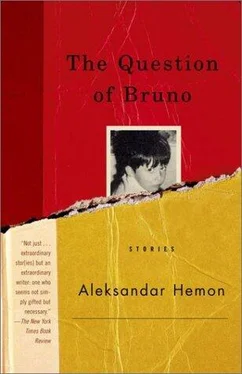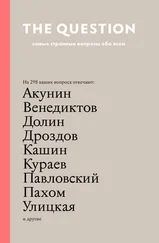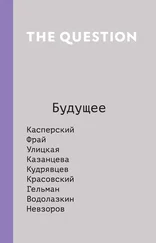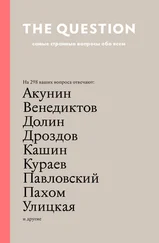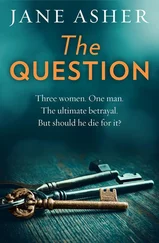On Tuesday I had a sensation (a hallucination?) of cockroaches scurrying up my shins — I may be losing my mind, because of the solitude and nothingness that constitute my life. I had the sensation at a rock show, while boys and girls shook their heads like rattles. I thought that the cockroaches were my home-grown cockroaches, that I brought them with me from my apartment, unknowingly. The next day I asked Art, my janitor, to help me and he gave me those roach motels in which roaches get lured by sweet syrup and then get stuck in glue. Let’s put it this way: Art provides room for abhorrent insects, Art terminates cockroaches.
I hate Kevin. He brought footage of yet another massacre: people crawling in their own blood, faceless skulls, limbs strewn, stuff like that. There was this woman, her arms were severed. You could see two frayed, blood-spurting stumps. She was raising the bloody mess of her ex-arms toward Kevin’s camera. Kevin had a close-up of her face, still in shock, not feeling any pain, not being armless yet. The close-up lasted for a good five minutes, like fucking Tarkovsky. I asked Kevin why he didn’t drop the goddamn camera and help the woman. He said there was nothing he could do. He’s a cameraman, he said, and that is what he does and how he helps people. I told him he shouldn’t have shot that close-up. He said he didn’t do it. It was his camera who did it, he just held it. I cut it out anyway. I put it on the Cinema Inferno tape. Nobody saw the footage but me. Kevin is so detached and so protected.
I sleep in a former TV studio, next to the editing room. It is windowless, of course, safe from shelling, unless they use concrete-piercing shells. Which they seldom do, for whatever reason. I suppose that even such a shell wouldn’t kill us immediately. It would just open a hole for more shells. I prefer to die immediately. The studio has a little stage where mindless folk singers used to perform their playback love pain. This is where we sleep, as if on a raft — on a stage soaked with false tears and real sweat. There are still several cameras in the studio, with their lenses turned to the floor, looking between their wheels, as if ashamed. The studio is immense and very dark. We light it with two strategically positioned candles. There is some electricity in the building, to be sure, produced by a coughing gasoline-run generator, but we need electricity to produce and broadcast images. We move around the studio as if blind, having a memory of the studio as the map in our heads. We never move cameras, lest we run into them and get hurt. But somehow they always get in our way, as if they’re moving silently behind our backs, like ghosts, recording us.
I’ve been sending letters for her through obscure Red Cross channels — it takes months for a Red Cross convoy to reach Sarajevo and even more for my letters to reach her. When they do, they’re already obsolete, they’re rendering someone other than myself, someone saner — a stranger not only to her but indeed to myself. When I’m writing those letters I have to accept my helplessness, I have to admit that someone else is writing them, using my body, my Pelikan fountain pen, my cramped right hand. Whatever I write, I feel it to be untrue, because it’ll be untrue in a day or two, if not in a moment or two. Whatever I say I am lying or will be lying. On the pages of the letter, the whiteness of the page stained with ink, a dismal present descends into a desolate past. That is why I tend to write her things that she already knows, tell her stories told wars ago. It is cowardly, I confess, but I’m just trying to create an illusion that our lives, however distant, may still be simultaneous.
The odor escaped Fatima’s room no matter what we tried to do. We stuffed the cracks between the door and the frame with rugs. We soaked the rugs and the door with vinegar and our useless perfumes (Obsession, Magie Noir). But the stench was always there — the sweet, dense, meaty scent of decay. In the midst of a rare and brief nocturnal lull in shelling, we decided to throw her out of the window, after my mother woke up screaming, having dreamt maggots coming out of her sister’s eye sockets.
Kevin and I, we get drunk over his stories, with bourbon that he keeps fetching from somewhere. He tells me then what he considers to be intimate things: about his long-time girlfriend, who was working as a real estate agent, having a dream of becoming a congresswoman. She was from a place called White Pigeon, Michigan, fifty miles south of Kalamazoo. While he was in the Gulf, she left him a message on his answering machine about leaving him because he was a “selfish dreamy idiot.” He tells me how he sees everything through a viewfinder. He has confidence in the camera objective. He feels natural with his camera, because “with the camera I see nothing alone.” There’s always another pair of eyes, he says.
A friend of mine asked me to help her identify some damaged buildings in Sarajevo; she sent me photographs hoping that I could recognize the buildings, but they were unidentifiable as far as I was concerned. They all looked the same: they all had shattered windows — black holes, as if their eyes had been gouged; there were rings of debris around them, as if ruins were being carved out of whole buildings; there were no people in the pictures. What was in the pictures were not buildings — let alone buildings I could’ve come in or out of: what was in the pictures was what was not in the pictures — the pictures recorded the very end of the process of disappearing, the nothingness itself.
People stand in line at Point A, waiting for their turn to run across. When it’s your turn, you cannot wait, you have to go, because the longer you wait, the readier the sniper is. Plus you don’t want to share the unspeakable fear of the waiting throng. The first time I ran from Point A to Point B, the fear was unspeakable indeed. Pain in your stomach, as if a big steel ball is grinding your bowels. Blood throbbing in your neck veins. Wet heat inside your eyeballs. Numbness of your limbs, increasing as you’re running. Sweat trickling down your cheeks, like a miniature avalanche of dread. You see no life unwinding before your eyes. All you see is one or two meters ahead of you and all the little things that you can trip over. You hear every tiny sound. Your feet brushing away dirt and rubble. Distant detonations. Cries of scared and wounded people. Whistling ricocheting bullets. The death rattle from the person behind you.
This is me in what’s left of the Library. If you could magnify this picture sufficiently you would see motes levitating around me — cold ashes of books. This picture was made on the day I got the bulletproof vest. It was one of the happiest days of my life, this life. A bulletproof vest significantly increases your (well, mine) chances of survival. The sniper has to shoot you in the head to kill you. Which is why I cut my hair so short, to make my head smaller. Sometimes I feel like a fucking Joan of Arc, except I have no army and no voices to guide me.
Mother and Father wrapped her up in a bedsheet, and then another one, and then another one, their faces distorted by the urge to vomit. I couldn’t watch when they actually pushed her over the windowsill, but I heard the thud. I thought, as if remembering a line from a movie: “Her life ended with a thud.”
Since April I have received no letters from Aida. From that time on I had to make up her letters, I had to write her letters for her, I had to imagine her, because that was the only way to break the siege and stay connected with her. I’m sure she’s alive, I’m sure that one of these days I’ll have a bundle of her consecutive letters stowed in my mailbox, I’m sure she’s writing them this very moment.
Читать дальше
